15 Best High-Protein Foods for Weight Loss
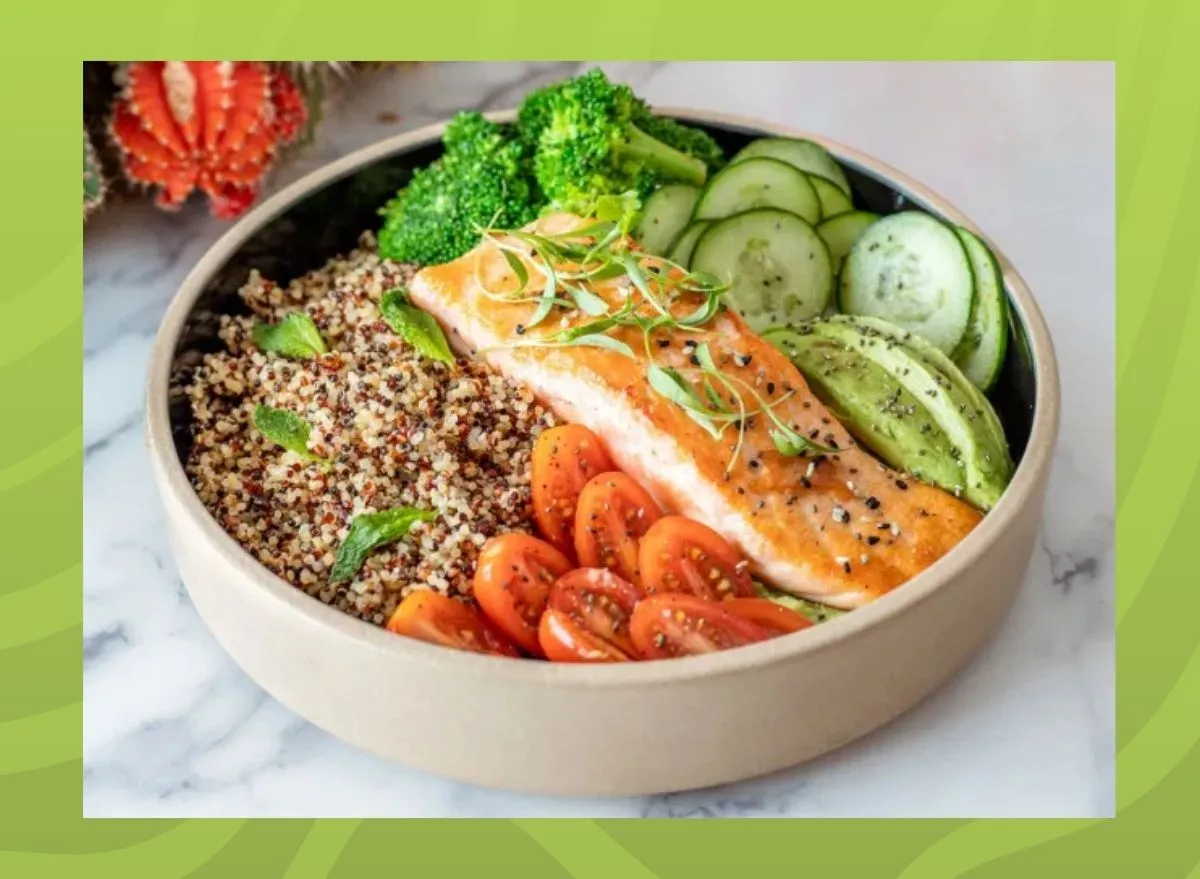
If you want to lose weight in a healthy, sustainable way, it’s essential to get adequate levels of protein in your daily diet. For one, consuming healthy protein helps you feel satiated for longer periods of time and reduces your hunger hormones, which can prevent overeating or snacking between meals. Protein also has a higher TEF (thermic effect of food) than fat or carbohydrates, meaning it helps your body burn more calories when you eat it. And on top of that, protein can help you build muscle mass.
But while it’s well-established that eating enough protein is crucial for healthy weight loss, the quality of your protein is also important. Not every high-protein food will actually help you lose weight. There are plenty of low-quality, nutrient-scarce proteins out there that may actually derail your efforts, and if you don’t know the difference, it’s easy to find yourself relying on just a few primary sources of protein. Apart from causing taste bud fatigue, it can also deny your body health-boosting nutrients found in protein-rich foods you’re overlooking.
So, whether you’re a fan of fish, can’t deny your love of dairy, or prefer to stick to a meat-free meal plan, we’ve got the best high-protein foods for weight loss.
How to choose a healthy protein for weight loss
The best high-protein foods for weight loss foods meet certain criteria:
- Low-fat: Protein foods that are low in fat are inherently lower in calories. Because weight loss requires a calorie deficit—meaning you burn more calories than you consume—eating low-fat, high-protein foods can aid weight loss.
- Low-calorie: Low-calorie protein foods are basically the same as low-fat protein foods. Most of the time, protein foods are low in calories because they’re low in fat. Another way protein foods can be low-calorie is if they’re low-carb, as carbohydrates are another calorie-dense macronutrient.
- Rich in protein: This would seem obvious, but if you want to follow a high-protein diet for weight loss, then the foods you choose need to be high in protein. What exactly is high protein? As defined by the FDA, it depends on the percentage of protein based on the recommended daily intake (RDI) of protein, which is 50 grams.
- Good sources of protein contain between 10 and 19 percent of your RDI, or 5 to 9.5 grams of protein.
- Excellent sources of protein contain 20 percent or more of your RDI, or over 10 grams of protein.
The best sources of protein are either going to be “good” or “excellent” sources of protein. Read on to learn more about the proteins that will help your waistline, and for more, don’t miss High-Protein Breakfasts That Keep You Full.
In this list:
- Eggs
- Beans
- Greek yogurt
- Pea protein
- Chicken breast
- Regular yogurt
- Tuna
- Quinoa
- Tofu
- Salmon
- Lentils
- Walnuts
- Whey protein powder
- Casein protein powder
- Low-fat cottage cheese
Eggs
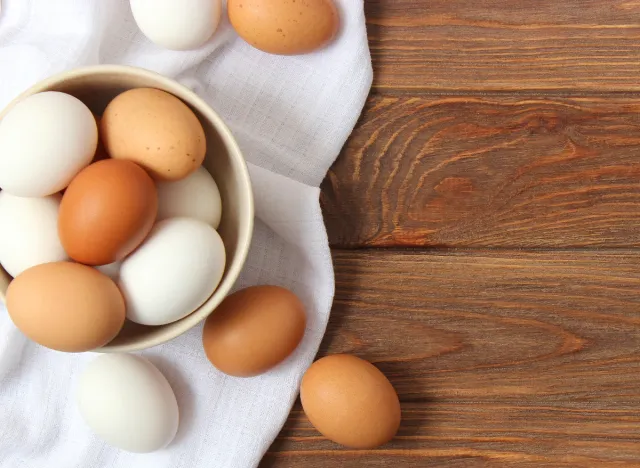
You can eat them hard-boiled, scrambled, sunny-side up, or soft-boiled in your favorite bowl of ramen, but however you choose to eat eggs, they’re guaranteed to give you a lean protein boost every time.
“At just about 70 calories each, eggs are packed with 6 grams of appetite-controlling protein that will keep you satisfied, helping you to avoid bingeing later in the day. In fact, research shows that eating eggs for breakfast reduces calorie intake over the next 24 hours,” say The Nutrition Twins, Tammy Lakatos Shames, RDN, CDN, CFT, and Lyssie Lakatos, RDN, CDN, CFT. “Plus, eggs are also a good source of vitamin D, and insufficient levels of vitamin D have been linked to higher levels of belly fat.”
The Nutrition Twins add that if you’re in a hurry, “another bonus is that eggs can be a portable source of protein. Hard-boil your eggs on the weekend so you can eat them on the go with a piece of fruit.”
Beans
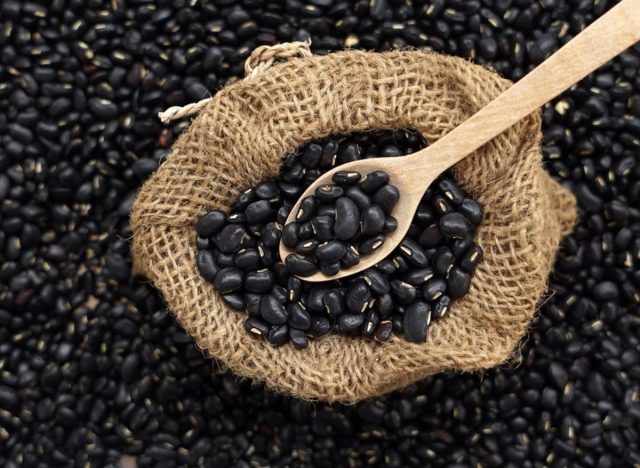
Beans are an extremely healthy, high-protein food because they are dense in fiber and contain about 7.5 grams of protein per 1/2 cup (cooked). “This protein and fiber combination makes beans ultra-satisfying, so they help to curb your intake (and calories) at mealtime and even prevent overeating at snack-time and your next meal,” say The Nutrition Twins. “In fact, a study published in Food and Nutrition found that people who ate a meal in which beans were the source of protein consumed 12% fewer calories at their next meal, thanks to the satiety created by the bean.”
“Of course, anything that helps you to snack less on junk food is good news for your waistline,” add the Twins. “And the fact that they’re versatile, tasty, affordable, and sustainable means they are easily one of the best sources of protein for weight loss.”
Greek yogurt
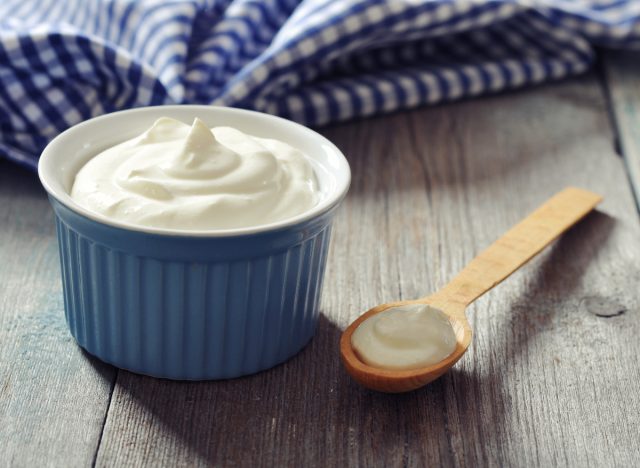
According to Lainey Younkin, MS, RD, weight loss dietitian at Lainey Younkin Nutrition, “Greek yogurt is one of the best high-protein foods for weight loss, especially as a breakfast or snack.”
“One serving of Greek yogurt packs in 15-17 grams of protein per 5.3 ounces,” says Younkin. To choose the healthiest Greek yogurt option, Younkin recommends choosing a 2% or low-fat version. “This will provide a little bit of fat, which, together with protein, will keep you full longer. Mix with berries for fiber and natural sweetness.”
Pea protein
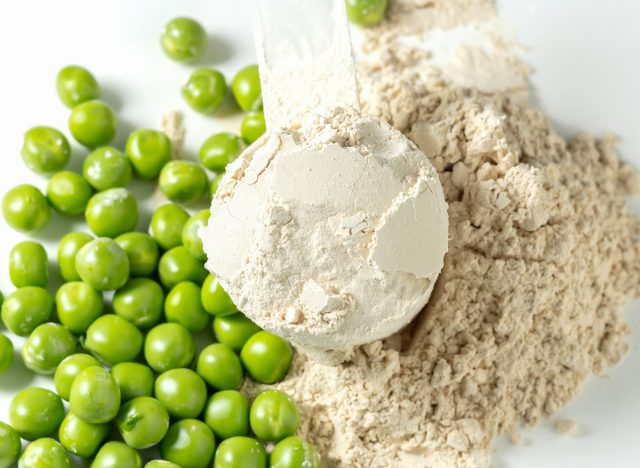
The words “pea protein” may not sound all too appetizing, but this plant-based protein supplement contains a whopping 21 grams of protein per 21-gram serving. And it’s also a great choice for vegans or those who are looking to consume less dairy.
“Pea protein is an overlooked yet ideal source of plant protein and is a superstar when it comes to weight loss,” say The Nutrition Twins. “Research has even found it to be more effective than whey protein at fighting against hunger,” they add.
If you’re not sure how to incorporate pea protein into your meals, The Nutrition Twins suggest tossing some into your fruit smoothie. “The combination of protein and fiber from the fruit and the pea protein will help keep energy and blood sugar levels balanced, thwarting the cravings and overeating that comes with them, as well as possible weight gain.”
Chicken breast
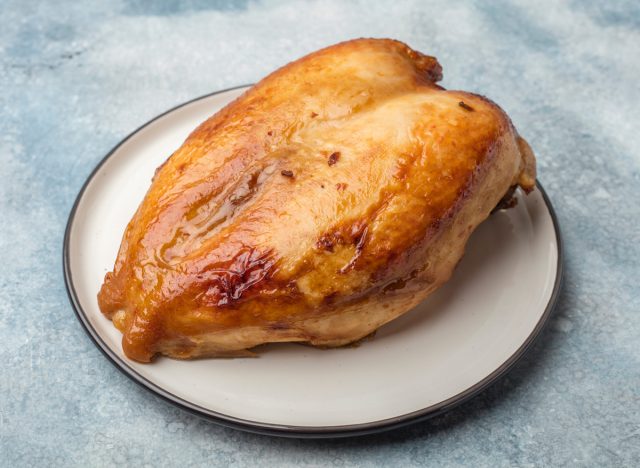
A simple chicken breast is one of the most versatile and leanest protein options for weight loss. Baked, grilled, tossed into a salad, thrown on top of pasta—the options for chicken are endless.
“Boneless, skinless chicken breast is a great high-protein option because it’s lean, low in fat, and rich in quality protein,” says Carrie Gabriel, MS, RDN. In a 4-ounce portion, you’ll get about 26 grams of protein, “plus essential amino acids needed for muscle growth, repair, and overall body function,” adds Gabriel.
Regular yogurt
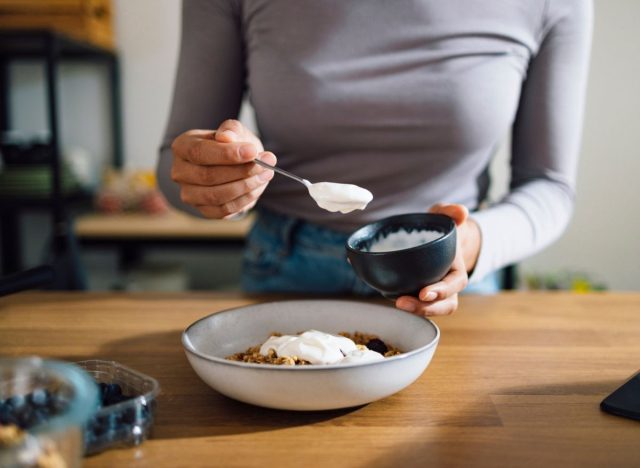
Greek yogurt makes our list of healthy high-protein foods for weight loss, but all types of dairy yogurt “can provide high-quality protein containing all of the essential amino acids,” says Toby Amidor, MS, RD, CDN, FAND. In fact, you’ll get about 11.9 grams of protein per 8-ounce container.
“Whether seeking satiety or preserving muscle during weight loss, yogurt packs a protein punch,” says Amidor. “In addition, including yogurt as part of a meal can help folks feel fuller longer between meals and snacks. A 2023 published systematic review found that a higher dairy intake, no matter what fat content of the dairy foods, showed no detrimental effects on anthropometric outcomes (like weight and BMI), blood fat levels (like LDL or ‘bad’ cholesterol), and blood pressure. Plus, yogurt was found to improve waist circumference.”
Tuna
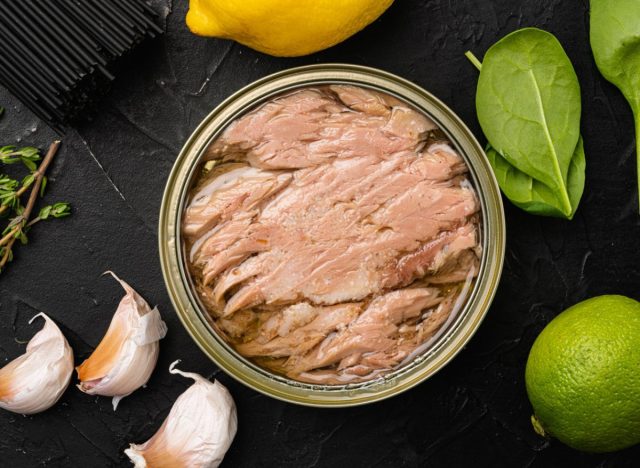
Canned tuna is one of the easiest ways to get a large boost of protein. You can make a tuna sandwich, throw it on a salad, eat it with some crackers, or just enjoy it straight out of the can. Either way, you’ll be treating your body to almost 25 grams of complete protein per 3-ounce serving—plus a hefty dose of healthy fats.
Quinoa
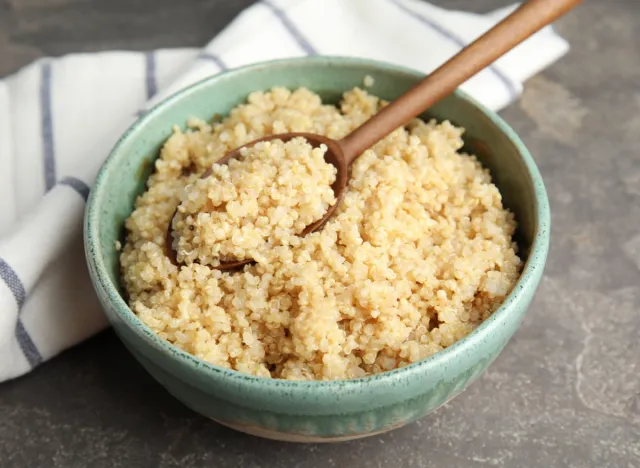
Quinoa’s 8 grams of protein per cup may not seem like a lot at first, but this grain is one of the few plant-based protein sources to be considered a complete protein—meaning it has all of the essential amino acids your body needs for the synthesis of proteins. Quinoa can be a fantastic, protein-dense replacement for white rice, and it goes perfectly with a tasty chicken breast or a heaping serving of black beans.
Tofu
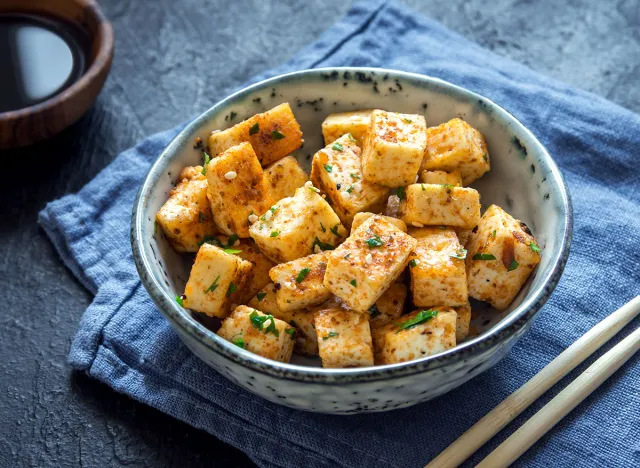
Another plant-based protein that’s great for weight loss (and general health) is tofu. Like quinoa, tofu is considered a complete protein source, delivering 9.2 grams per 3 ounces. This versatile option can be cut up and fried, thrown in a stir fry, or even blended into your favorite smoothie. Since it only has a little over 3 grams of fat per serving, it qualifies as a low-fat, high-protein food that can help you reach your weight-loss goals.
Salmon
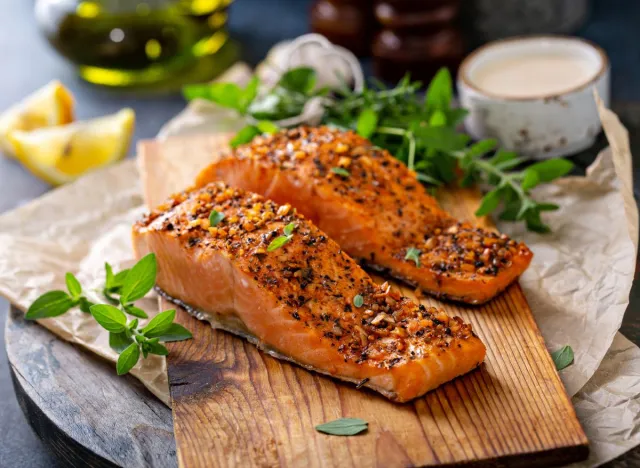
If you’re a fan of seafood, you may want to consider adding more fatty fish like salmon—which provides 15.6 grams of protein per 3 ounces—to your weight loss plan.
“A diet rich in omega-3 fatty acids can help promote satiety among certain populations, and salmon is one of the best sources of this healthy fat,” says Lauren Manaker, MS, RDN, author of The First Time Mom’s Pregnancy Cookbook and Fueling Male Fertility. “Data shows that the inclusion of fish, like salmon, as part of an energy-restricted diet resulted in weight loss after four weeks vs. a similar diet without seafood, highlighting that the addition of seafood to a nutritionally balanced energy-restricted diet may boost weight loss.”
Lentils
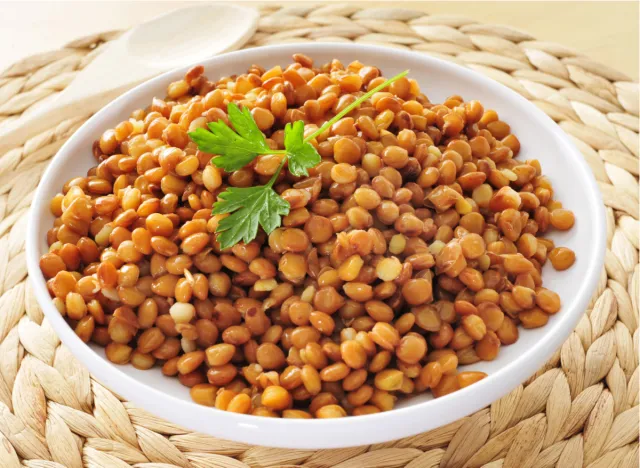
Because lentils are technically grain legumes (also known as pulses), people may not think of them as a high-protein food. However, lentils are a good source of protein, packing 10 grams per 35-gram serving, and also contain other helpful vitamins and nutrients.
“Eating lentils can give the body a boost of fiber, antioxidants, and important micronutrients, and data shows that eating lentils can help people lose weight, even when diets are not calorie restricted,” says Manaker. “Subbing out lentils for fatty meat choices can be an approachable way to support weight loss.”
Walnuts
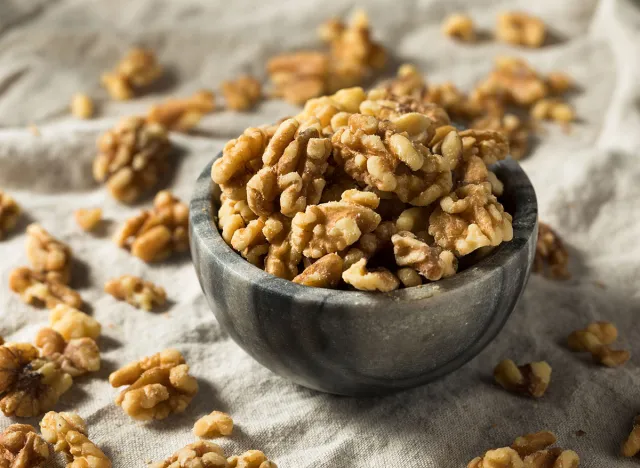
“Increasing daily consumption of nuts is associated with less long-term weight gain and a lower risk of obesity in adults, so replacing 0.5 servings a day of less healthful foods with nuts may help prevent long-term weight gain and obesity,” says Manaker.
When it comes to nuts, walnuts, with 4.3 grams of protein per ounce, are extremely effective in aiding in weight loss efforts. “Consuming walnuts has been linked to increased satiety, which may help people lose weight in the long run,” says Manaker, “and walnuts are the only tree nut that is an excellent source of alpha-linolenic acid (ALA), the plant-based omega-3 essential fatty acid.”
Whey protein powder
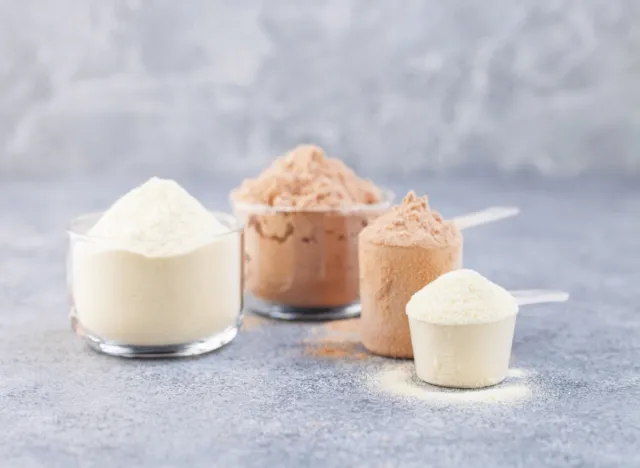
If you’re looking for a healthy protein powder to throw into a delicious shake, you may want to try whey protein, which delivers 20 grams of protein per 25.3-gram serving.
“Whey protein can boost fullness quickly, as it contains all the essential amino acids and is absorbed quickly in the body,” says Courtney D’Angelo, MS, RD, author at Go Wellness. “There have been numerous studies conducted with whey protein and weight loss, with most studies concluding that whey protein reduces fat and increases lean muscle mass. It has also been found that whey protein helps you stay full longer and reduces food cravings throughout the day.”
The main difference between whey protein and many other types of protein powder is that whey protein has dairy, so you can try a plant-based powder if you’re dairy-free.
Casein protein powder
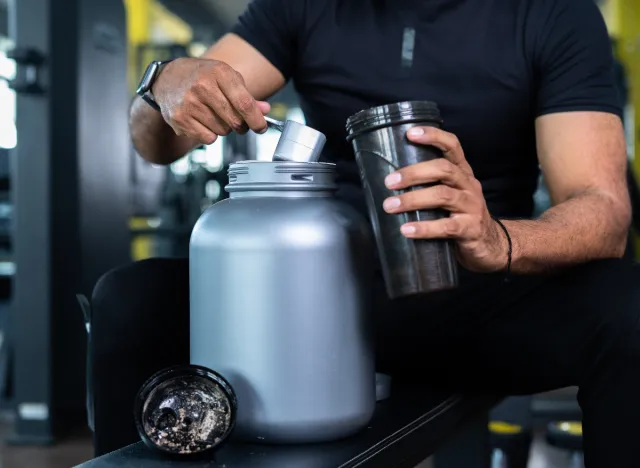
Another popular type of protein powder is casein protein, which D’Angelo says is also great for helping you with your weight loss goals, thanks to its 20 grams of protein per 33-gram serving.
“Casein protein is very similar to whey protein in that it’s also milk-based and contains all the essential amino acids, but the major difference is that casein protein is absorbed slowly in the body,” says D’Angelo. “This means that you’ll be feeling fuller for a longer period of time compared to whey protein, and while casein protein is not as good for increasing muscle mass, it is more effective than many other protein sources.”
Low-fat cottage cheese
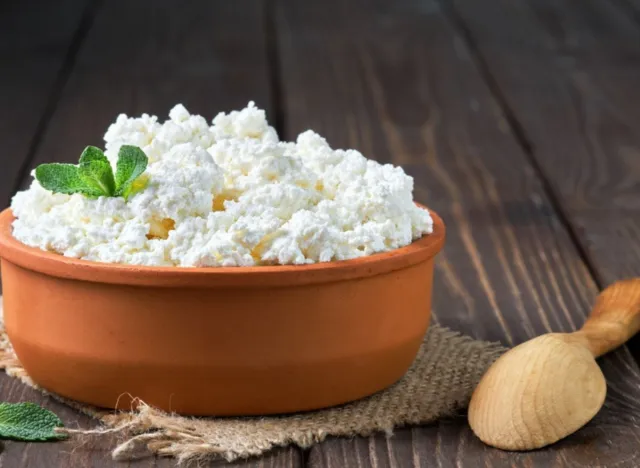
You may not think of cottage cheese as a protein-heavy food, but choosing the right type of cottage cheese can give you a huge protein boost with very little fat and sugar.
In a standard cup of 2% cottage cheese, you’ll get over 24 grams of protein, with 5 grams of fat and 9 grams of sugar from the lactose. If you want spice it up, you can add your favorite fruit or a drizzle of honey.
Why Trust Eat This, Not That!?
Eat This, Not That! is committed to creating high-quality content that you can trust to be accurate, properly researched, routinely reviewed, and updated with the latest information. Our writers, editors, and medical and/or certified experts consider this to be an unwavering promise we make to our readers in the pursuit of delivering impactful and meaningful content.
- Source: https://pubmed.ncbi.nlm.nih.gov/20226994/
- Source: https://www.ncbi.nlm.nih.gov/pmc/articles/PMC5073301/
- Source: https://fdc.nal.usda.gov/fdc-app.html#/food-details/170894/nutrients
- Source: https://www.ncbi.nlm.nih.gov/pmc/articles/PMC3295702/
- Source: https://pubmed.ncbi.nlm.nih.gov/36914032/
- Source: https://pubmed.ncbi.nlm.nih.gov/18602429/
- Source: https://pubmed.ncbi.nlm.nih.gov/17502874/
- Source: https://pubmed.ncbi.nlm.nih.gov/27030531/
- Source: https://nutrition.bmj.com/content/early/2019/08/27/bmjnph-2019-000034.info
- Source: https://pubmed.ncbi.nlm.nih.gov/19910942/
- Source: https://fdc.nal.usda.gov/food-details/328841/nutrients









